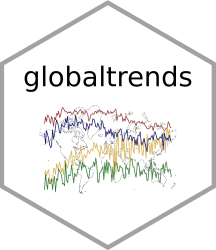Download and Measure Global Trends Through Google Search Volumes.
globaltrends

Google offers public access to global search volumes through its search engine through the Google Trends portal. The globaltrends package downloads search volumes provided by Google Trends and uses them to measure and analyze the distribution of search trends across countries or within countries. globaltrends allows researchers and analysts to investigate patterns within these trends, such as degree of internationalization of firms and organizations or dissemination of political, social, or technological trends across the globe or within single countries.
To measure degree of internationalization, globaltrends offers a wide array of empirical possibilities. It allows researchers to compare degree of internationalization for various organizations on a unified scale. In addition, the time-series nature of Google Trends allows for historical analysis of internationalization patterns and speed within organizations.
The enormous detail of the data opens additional applications in research that are impossible with traditional measures of internationalization. For instance, using globaltrends on a subnational level allows researchers to study proliferation within a country and, for example, to trace a particular market entry. In addition, globaltrends offers applications beyond corporate internationalization, such as data on global interest in products, persons, events, fads or scandals, even academic authors and papers.
globaltrends provides user-friendly access to Google Trends. The package vignette offers additional technical details and a basic tutorial. Please, refer to the package NEWS for change log.
# install ----------------------------------------------------------------------
# current cran version
install.packages("globaltrends")
# current dev version
devtools::install_github("ha-pu/globaltrends", build_vignettes = TRUE)
# packages ---------------------------------------------------------------------
library(dplyr)
library(globaltrends)
# connect to db ----------------------------------------------------------------
initialize_db()
start_db()
# add new control batch --------------------------------------------------------
new_control <- add_control_keyword(keyword = c("gmail", "map", "translate", "wikipedia", "youtube"))
# add new object batch ---------------------------------------------------------
new_object <- add_object_keyword(keyword = c("manchester united", "real madrid"))
# run control download ---------------------------------------------------------
download_control(control = new_control)
download_control_global(control = new_control)
# run object download ----------------------------------------------------------
download_object(object = new_object)
download_object_global(object = new_object)
# compute search score ---------------------------------------------------------
compute_score(control = new_control, object = new_object)
compute_voi(control = new_control, object = new_object)
# compute degree of internationalization ---------------------------------------
compute_doi(control = new_control, object = new_object)
# export data ------------------------------------------------------------------
out_score <- export_score(keyword = "manchester united")
out_voi <- export_voi(keyword = "manchester united")
out_doi <- export_doi(type = "obs", locations = "countries")
# plot data --------------------------------------------------------------------
plot_bar(data = out_score)
plot_ts(data = out_score)
plot_box(data = out_score)
plot_ts(data = out_voi)
plot_box(data = out_voi)
plot_ts(data = out_doi)
plot_box(data = out_doi)
plot_voi_doi(data_voi = out_voi, data_doi = out_doi)
# get abnormal internationalization --------------------------------------------
abnorm_score <- get_abnorm_hist(data = out_score)
plot_bar(data = abnorm_score)
plot_ts(data = abnorm_score)
plot_box(data = abnorm_score)
abnorm_voi <- get_abnorm_hist(data = out_voi)
plot_ts(data = abnorm_voi)
plot_box(data = abnorm_voi)
abnorm_doi <- get_abnorm_hist(data = out_doi)
plot_ts(data = abnorm_doi)
plot_box(data = abnorm_doi)
# disconnect from db -----------------------------------------------------------
disconnect_db()
If you use the globaltrends package, please cite it as: Puhr, H., & Müllner, J. (2021). Let me Google that for you: Capturing globalization using Google Trends (SSRN Working Paper 3969013). Available at https://www.ssrn.com/abstract=3969013.